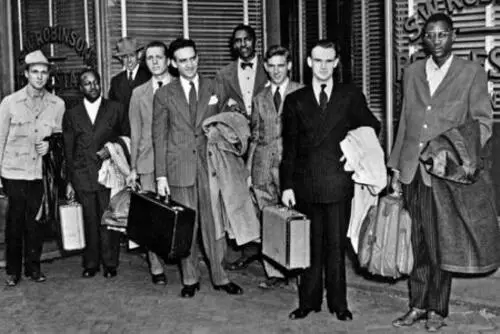Fellowship of Reconciliation
The Fellowship of Reconciliation (FOR) was founded by a group of clergyman at an international conference at Lake Constance in 1914. These Christian pacifists were totally opposed to nations using violence to solve international problems. Early members in the FOR in the United States included Abraham Muste, Norman Thomas, Roger Baldwin, Anna Murray, Scott Nearing and Oswald Garrison Villard.
In 1940 Abraham Muste was appointed executive secretary of the organization. In this position Muste led the campaign against United States involvement in the Second World War. Two years later Muste gave permission for James Farmer, George Houser and Bayard Rustin to establish the Congress on Racial Equality (CORE), a group that was to play a leading role in the struggle for African American civil rights.
In early 1947, the Congress on Racial Equality announced plans to send eight white and eight black men into the Deep South to test the Supreme Court ruling that declared segregation in interstate travel unconstitutional. organized by George Houser and Bayard Rustin, the Journey of Reconciliation was to be a two week pilgrimage through Virginia, North Carolina, Tennessee and Kentucky.
Although Walter White of the National Association for the Advancement of Coloured People (NAACP) was against this kind of direct action, he volunteered the service of its southern attorneys during the campaign. Thurgood Marshall, head of the NAACP's legal department, was strongly against the Journey of Reconciliation and warned that a "disobedience movement on the part of Negroes and their white allies, if employed in the South, would result in wholesale slaughter with no good achieved."
The Journey of Reconciliation began on 9th April, 1947. The team included George Houser, Bayard Rustin, James Peck, Igal Roodenko, Joseph Felmet, Nathan Wright, Conrad Lynn, Wallace Nelson, Andrew Johnson, Eugene Stanley, Dennis Banks, William Worthy, Louis Adams, Worth Randle and Homer Jack.

Wallace Nelson, Ernest Bromley, James Peck, Igal Roodenko, Bayard Rustin,
Joseph Felmet, George Houser and Andrew Johnson.
Primary Sources
(1) Bayard Rustin, was an early member of the Fellowship of Reconciliation. He wrote a letter to his friend, Joseph Beam, about why he joined the organization.
My activism did not spring from being black. Rather, it is rooted fundamentally in my Quaker upbringing and the values instilled in me by the grandparents who reared me. Those values were based on the concept of a single human family and the belief that all members of the family are equal. The racial injustice that was present in this country during my youth was a challenge to my belief in the oneness of the human family. I worked side-by-side with many white people who held these values, some of whom gave as much, if not more, to the struggle than myself.
(2) A member of the Fellowship of Reconciliation, Pauli Murray and her friend, Adelene McBean, became involved in attempts to end segregation on public transport and this resulted in their arrest and imprisonment in March 1940 for refusing to sit at the back of a bus in Virginia.
At Petersburg, several white passengers got off and others moved forward leaving two rows of empty seats directly in front of us. Outside the bus, about twenty picnic-bound Negroes laden with baskets of food lined up to get aboard. The driver paid no attention to us and busied himself with tickets and baggage. We realized that if we were going to change to a more comfortable position we had better do it before the crowd got on and filled up the entire rear, so we moved one row forward. The cushion of the window seat had fallen down and we could not adjust it, so we moved forward another row. We were now in the fourth row from the back seat, still behind all the white passengers. At this point the driver, whose name was Frank W. Morris, as we learned later, looked back and saw us. He yelled from the front that we would have to move back. When we showed no inclination to comply, he threatened arrest.
Adelene McBean told the driver she had paid her money like every other passenger and she had her rights. It was clear that Morris was not listening; he was aware only that we had challenged his authority and ignored his order. He stormed off the bus, which was now electric with tension, but we could expect no support from either front or rear. The white passengers acted as if it was none of their affair and the few black passengers in the rear murmured among themselves but dared not interfere.

